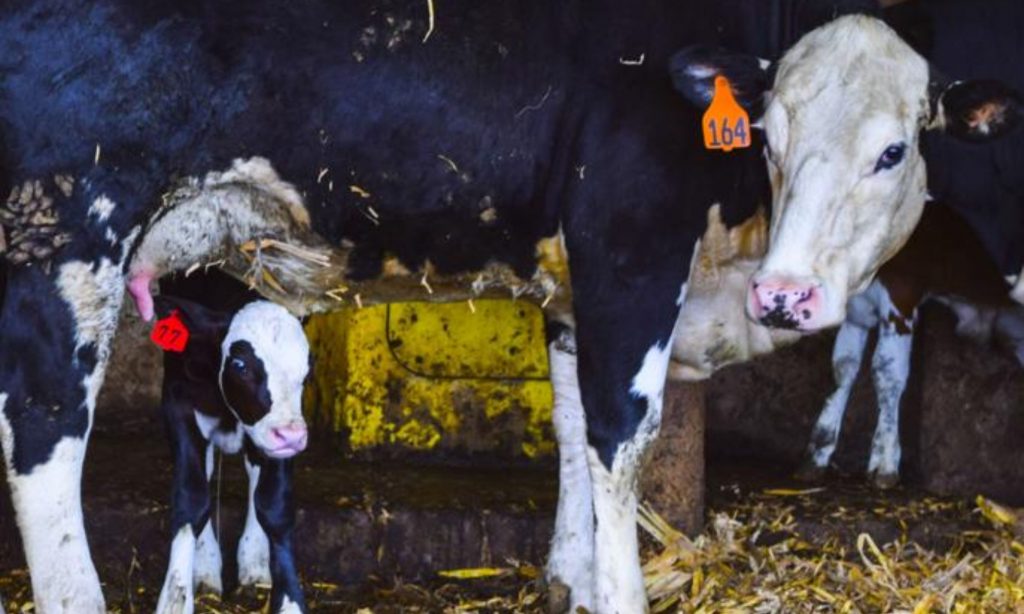But to reach the Global Dairy Platform’s goal of net-zero emissions by 2050 the industry needs to reduce annual emissions or find ways to compensate for unavoidable emissions.


But to reach the Global Dairy Platform’s goal of net-zero emissions by 2050 the industry needs to reduce annual emissions or find ways to compensate for unavoidable emissions.
There will be no one solution to reaching that goal. To reduce emissions or compensate for them, each dairy farmer will need to look at his or her own farm from many angles – from feeding practices to choice of cropping system to manure management. Climate-smart dairy involves adapting to climate change while contributing to farm income and food security.
It’s helpful for farmers to learn what others are doing, said Michel Wattiaux, a professor of dairy nutrition and management at the University of Wisconsin-Madison. He said farmers may be interested in reading “Climate-smart agriculture case studies 2021 – projects from around the world,” which was published by the Food and Agriculture Organization of the United Nations.
One of the case studies features a public-private partnership in Switzerland. Farmers there are being incentivized by the Swiss government to reduce greenhouse-gas emissions through a set of measures that best suits their operations.
There are four greenhouse-gas-reduction measures covered by the public-private project.
• Increase the number of lactations per cow, thus reducing the percentage of non-productive animals in the herd – such as heifers or dry cows.
• Increase lifetime performance of each animal.
• Install biogas fermenters to convert manure into energy.
• Increase dairy-beef production by using dual-use breeds and sexed semen so animals may be used for both milk and meat production.
The project is a partnership between the Swiss Federal Office for Agriculture, milk-processor Nestle and dairy-producer-organization Aaremilch AG. The Bern University of Applied Sciences has been providing scientific support.
In 2019 there were 22 million kilograms of milk – about 48.5 million pounds – produced using climate-smart livestock practices on 147 Swiss farms. Possibilities to scale the project seem promising, according to the Food and Agriculture report. Countrywide implementation of the project could result in a significant reduction of overall greenhouse-gas emissions from the Swiss agricultural sector within a couple of years.
The project’s successes have been the result of farmer implementation of the project’s four climate-smart agricultural practices. Discussion between farmers, industry representatives and scientists were consistent factors throughout the project. But calculating greenhouse-gas balances based on a limited set of input data presented a challenge.
So participants are discussing ways to improve a herd-level greenhouse-gas calculator. They’re especially focused on increasing the number of lactations per cow and improving a cow’s lifetime performance. New Swiss agricultural policy is expected to include financial incentives for farmers to increase a cow’s number of lactations; that would encourage producers to keep older cows.
Between 2005 and 2015 the global milking-cow population increased by 11 percent and average milk production increased by 15 percent. The combination of the increased cow population and productivity resulted in a 30 percent increase in global milk supply. It also resulted in an 18 percent increase in greenhouse-gas emissions. That’s according to a report by the Food and Agriculture Organization and the Global Dairy Platform.
Without an improvement in efficiency, the dairy industry’s total greenhouse-gas emissions would have increased by 38 percent. So the industry’s continued focus on improving feed efficiency – including genetic selection for feed efficiency or less-methane-emitting cows – remains important, Wattiaux said.
Feeding better-quality feed will remain important. At the same time producers should avoid overfeeding protein to cows because it can increase nitrous-oxide emissions – another greenhouse gas – from manure, he said. Farmers may want to feed 16 percent to 16.5 percent protein in early-lactation rations, and then reduce the percentage to 15.5 percent as lactation progresses.
Feed additives to reduce enteric-methane emissions are coming to the market but some of them don’t necessarily make the cow any more efficient, he said. But researchers in Switzerland are studying the use of linseed as an additive; it contributes fat to the diet and reduces enteric methane.
Farmers may ask why they should pay for additives. That may become a question that consumers or governments ultimately need to answer.
Wattiaux is one of the speakers scheduled to discuss climate-smart dairy at the 2023 Wisconsin Agricultural Outlook Forum, which will be held Jan. 24 in Union South on the UW-Madison campus.
Legal notice about Intellectual Property in digital contents. All information contained in these pages that is NOT owned by eDairy News and is NOT considered “public domain” by legal regulations, are registered trademarks of their respective owners and recognized by our company as such. The publication on the eDairy News website is made for the purpose of gathering information, respecting the rules contained in the Berne Convention for the Protection of Literary and Artistic Works; in Law 11.723 and other applicable rules. Any claim arising from the information contained in the eDairy News website shall be subject to the jurisdiction of the Ordinary Courts of the First Judicial District of the Province of Córdoba, Argentina, with seat in the City of Córdoba, excluding any other jurisdiction, including the Federal.
1.
2.
3.
4.
5.
eDairy News Spanish
eDairy News PORTUGUESE
